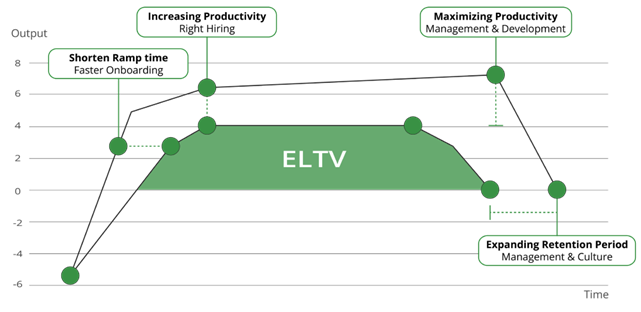Jeremy Tiffin • December 1, 2025
Finance has always been about the numbers.
But in a world where speed, insight, and adaptability define performance, one number stands above the rest:
Employee Lifetime Value (ELTV).
Every finance leader knows the challenge.
Budgets are tight. Talent is scarce. And the demand for faster, smarter insight never stops.
But here’s the question few stop to ask:
How much value does each hire actually create over time?
That’s the premise behind
The Value Equation.
When you look at hiring through the lens of value creation instead of seat filling, everything changes.

1. What ELTV Really Measures
Most hiring metrics tell you how efficiently you hire, not how effectively.
Time to hire, cost per hire, and offer acceptance measure activity, not impact.
ELTV flips that.
It focuses on what happens after the hire, the value a person generates from onboarding to peak performance to the point they exit.
Think of ELTV as the ROI of hiring.
When ELTV is high, employees ramp faster, stay longer, and make a measurable impact.
When it’s low, it usually traces back to one of three things:
- Expectations weren’t clear
- Onboarding was weak
- Growth pathways didn’t exist
The lesson is simple: hiring isn’t complete when an offer is signed.
It’s complete when results show up.
2. How to Build ELTV Into Finance Hiring
To raise ELTV, finance leaders need to think like investors.
You’re not just spending salary dollars. You’re allocating capital in trust, time, and training. The goal is to earn a return.
Hire for outcomes, not resumes.
A technically capable candidate isn’t always a high-value one.
The right hire moves the business forward, improves forecast accuracy, tightens the close, and strengthens decision-making.
Structure onboarding around value creation.
Most new hires spend their first 60 days trying to figure out what “good” looks like.
A clear 30-60-90 plan tied to business outcomes shortens the ramp and compounds contribution faster.
Create ownership, not just access.
In finance, clarity creates confidence.
When people understand their decision rights and deliverables, they move with autonomy. That autonomy fuels performance and raises ELTV by reducing friction and rework.
3. Why ELTV Matters More Than Experience
Experience tells you what someone has done.
ELTV tells you what they’ll do for you.
In finance, a single mis-hire can erase months of progress.
That’s why hiring for value alignment matters more than years of experience.
Top performers connect their work to measurable outcomes.
They see how improving one process or forecast compounds across the business.
The best finance teams design every hire, process, and system to compound value.
That is how they turn talent decisions into business advantage.
4. Measuring What Matters
Modern finance teams no longer define performance by headcount or cost.
They measure value per person and how it grows over time.
That shift changes hiring from a transaction to a leadership decision.
It positions finance as a strategic enabler of growth, not just a reporting function.
When every hire is measured by the value they deliver, not just the tasks they complete,
you stop managing payroll and start managing performance multipliers.
Final Thought
Employee Lifetime Value isn’t a hiring metric. It’s a leadership mindset.
Finance leaders who adopt it will build teams that scale faster, stay longer, and deliver outcomes that last well beyond a fiscal year.
Because great hiring isn’t about filling roles.
It’s about multiplying value.
Share Blog
Latest Blogs



